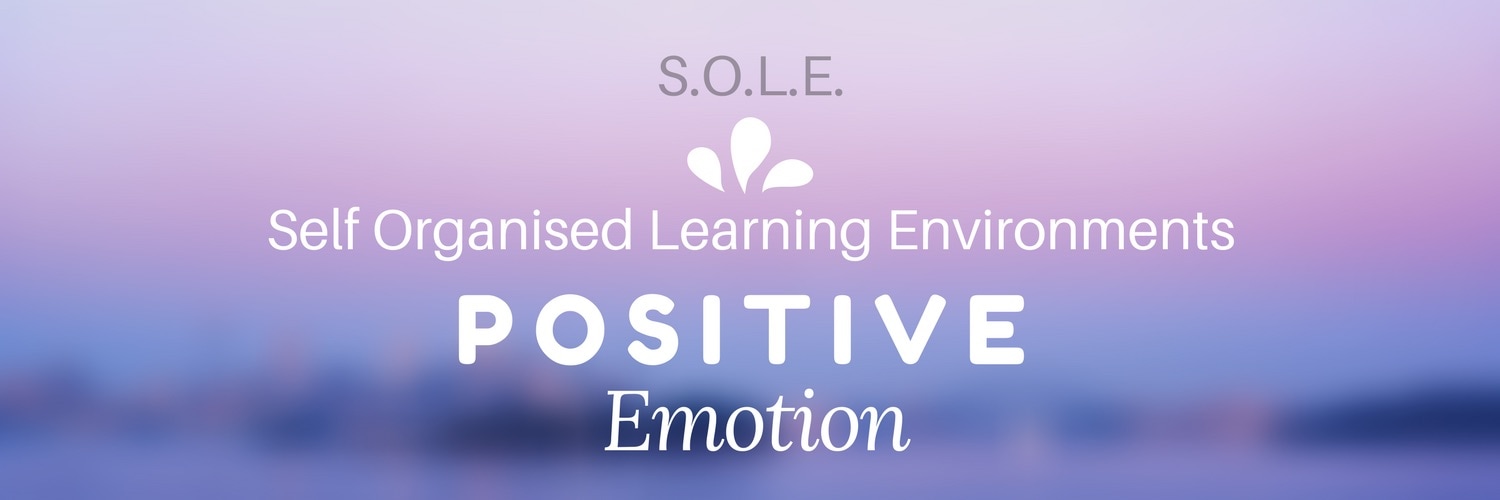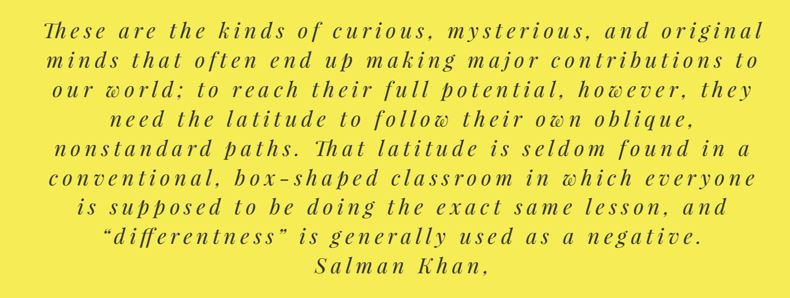positive outcomes of S.O.L.E.

One question that we kept coming back to and looking for answers to was "how can we encourage greater curiosity in our students and allow them to take greater control over their own learning?"
There were students who appeared happy to sit back and wait till the teacher came to point them in the right direction, or explain something or showed them how to do the next step.
We felt that our students needed to be encouraged to take more risks with their learning and take greater responsibility to find out for themselves.... but how were we going to do this?
The sense of belonging and connectedness that students experience in a S.O.L.E. session nurtures and reinforces positive interpersonal rapport between students which helps positive behaviour. Students that feel that they belong and who are positively involved in the classroom are more likely to demonstrate an acceptance of authority and to display an ability to regulate their behavior in the classroom - we all have a psychological need for meaningful belonging ( especially students who do not get that emotional support at home)
Students respond positively if they believe the rules/expectations are inclusive and fair and where a sense of powerlessness and alienation from teachers is reduced.
A meta analysis of over 100 studies into behaviour management has found that teachers who possess high quality relationships with their students experience 31% less behavioural difficulties in the classroom.
There were students who appeared happy to sit back and wait till the teacher came to point them in the right direction, or explain something or showed them how to do the next step.
We felt that our students needed to be encouraged to take more risks with their learning and take greater responsibility to find out for themselves.... but how were we going to do this?
The sense of belonging and connectedness that students experience in a S.O.L.E. session nurtures and reinforces positive interpersonal rapport between students which helps positive behaviour. Students that feel that they belong and who are positively involved in the classroom are more likely to demonstrate an acceptance of authority and to display an ability to regulate their behavior in the classroom - we all have a psychological need for meaningful belonging ( especially students who do not get that emotional support at home)
Students respond positively if they believe the rules/expectations are inclusive and fair and where a sense of powerlessness and alienation from teachers is reduced.
A meta analysis of over 100 studies into behaviour management has found that teachers who possess high quality relationships with their students experience 31% less behavioural difficulties in the classroom.

There are many positive outcomes for students in a SOLE session which include:
Greater autonomy, student agency and scope to find information and learning concepts for themselves;
Fitting in - being part of something;
Taking responsibility for their own choices, behaviours, time management, organising tasks;
Collaboration with others and sharing;
Students are released to explore wider aspects of the curriculum that the teacher may not cover; and
Students are able to make cross curricula connections.
In S.O.L.E. you will also notice students displaying the following elements of co-operative learning:
- Individual & Group accountability (ensure all members contribute to the achievement of the goals and learn as individuals)
- Positive Interdependence (ensure that success of an individual promotes the success of other team members)
- Group processing (promote group & individual reflection for maintenance of group effectiveness & success)
Through S.O.L.E. a sense of mutual trust and respect is nurtured. S.O.L.E. encourages the students to ask questions, but questions are not simply a means to gather information. When students formulate and ask their own questions they can:
-identify their own knowledge gaps;
- think critically about what they are learning;
- assess information from individuals and other sources;
- think creatively and divergently;
- learn constructively with others; and
- refine their skills of formulating questions.
There are many positive outcomes for teachers in a SOLE session which include:
- Teachers have another strategy they can use to deliver the curriculum which allows students to take greater ownership of the learning process;
- S.O.L.E. supports the delivery of system based outcomes including both content and student capabilities;
- Teachers are less stressed in a S.O.L.E. session because students are more active and engaged in the learning;
- S.O.L.E. allows teachers to make connections within topic areas and across the curriculum;
The research component of S.O.L.E. allows teachers to observe behaviours and learning patterns and to focus on supporting student learning rather than intervening in the learning. Following the research component students share their findings. During this time the teacher can stimulate discussion, pose questions to provoke thinking or make suggestions. They help students make sense of the information. They assist in clarifying student misconceptions of concepts and allow misconceptions to be discussed and challenged - this is achieved through conversation and questioning.
They can also provide feedback to individuals or groups based on their observations of students in the research phase. This is effective on many levels as it allows immediate feedback on positive behaviours as well as what students need to be aware of and improve in the following sessions. This also can provide students with a "heads up" concerning their personal choices and behaviours and cover anticipated likely problems in the future. It is also an excellent time for teacher led student feedback to each other which can be helpful.
Greater autonomy, student agency and scope to find information and learning concepts for themselves;
Fitting in - being part of something;
Taking responsibility for their own choices, behaviours, time management, organising tasks;
Collaboration with others and sharing;
Students are released to explore wider aspects of the curriculum that the teacher may not cover; and
Students are able to make cross curricula connections.
In S.O.L.E. you will also notice students displaying the following elements of co-operative learning:
- Individual & Group accountability (ensure all members contribute to the achievement of the goals and learn as individuals)
- Positive Interdependence (ensure that success of an individual promotes the success of other team members)
- Group processing (promote group & individual reflection for maintenance of group effectiveness & success)
Through S.O.L.E. a sense of mutual trust and respect is nurtured. S.O.L.E. encourages the students to ask questions, but questions are not simply a means to gather information. When students formulate and ask their own questions they can:
-identify their own knowledge gaps;
- think critically about what they are learning;
- assess information from individuals and other sources;
- think creatively and divergently;
- learn constructively with others; and
- refine their skills of formulating questions.
There are many positive outcomes for teachers in a SOLE session which include:
- Teachers have another strategy they can use to deliver the curriculum which allows students to take greater ownership of the learning process;
- S.O.L.E. supports the delivery of system based outcomes including both content and student capabilities;
- Teachers are less stressed in a S.O.L.E. session because students are more active and engaged in the learning;
- S.O.L.E. allows teachers to make connections within topic areas and across the curriculum;
The research component of S.O.L.E. allows teachers to observe behaviours and learning patterns and to focus on supporting student learning rather than intervening in the learning. Following the research component students share their findings. During this time the teacher can stimulate discussion, pose questions to provoke thinking or make suggestions. They help students make sense of the information. They assist in clarifying student misconceptions of concepts and allow misconceptions to be discussed and challenged - this is achieved through conversation and questioning.
They can also provide feedback to individuals or groups based on their observations of students in the research phase. This is effective on many levels as it allows immediate feedback on positive behaviours as well as what students need to be aware of and improve in the following sessions. This also can provide students with a "heads up" concerning their personal choices and behaviours and cover anticipated likely problems in the future. It is also an excellent time for teacher led student feedback to each other which can be helpful.
evidence of learning
|
|
This example of Collective Knowledge shows evidence of student learning. Students have researched and discovered core content.
They have listed key information and included their own personal thoughts and opinions - something which we encourage in every session. A Success Criteria has been provided as a way of tracking learning. It is our preference to utilise Success Criteria to track learning rather than inform and direct the research. |


